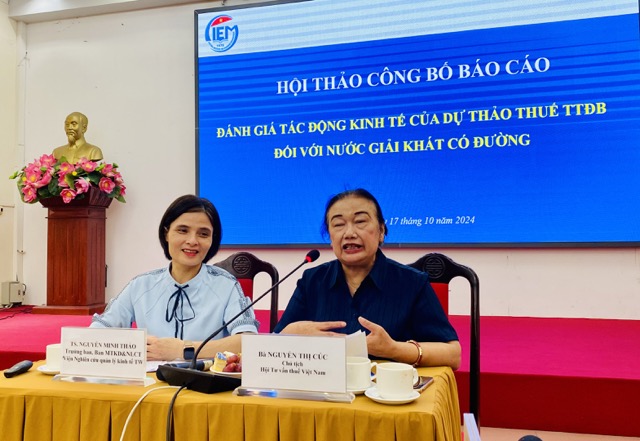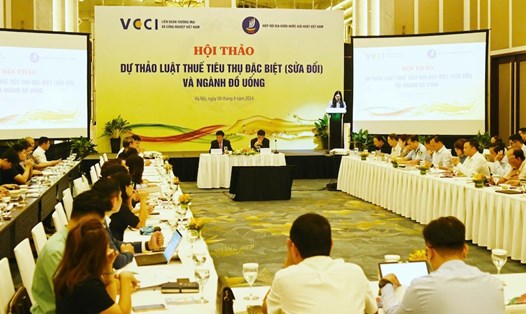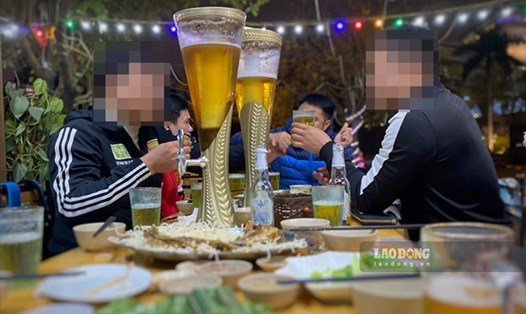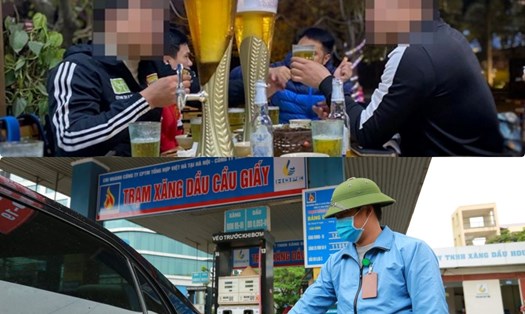At the workshop to announce the economic impact assessment report of the draft Law on Special Consumption Tax on Sugary Beverages organized by the Central Institute for Economic Management (CIEM) on October 17, Ms. Nguyen Minh Thao - Head of the CIEM Business Environment and Competitiveness Department - said that the draft Law on Special Consumption Tax was developed but has not fully assessed the economic impacts.
Meanwhile, the Draft proposes to apply a tax rate of 10%, on the grounds that this is an item that affects human health, contributing to the situation of overweight and obesity.
Through research and impact assessment pointed out by CIEM, the tax will significantly shrink the scale of the beverage industry, with added value decreasing by VND5,650 billion and production value decreasing by VND5,524 billion.
Assessing the indirect impact on 24 sectors in the economy when imposing taxes, the production value will decrease by more than VND 55,500 billion and the added value will decrease by VND 51,077 billion. As a result, the GDP of the whole economy will decrease by 0.448%, equivalent to VND 42,570 billion.
The imposition of taxes helps increase budget revenue, especially in the first year. Including indirect taxes increasing by VND8,500 billion, but direct taxes (corporate income tax) decreased by VND2,152 billion. However, in the following cycles (from the second year of tax calculation), indirect taxes will decrease by 0.496%, equivalent to nearly VND5,000 billion.
For businesses, due to the reduction in production, asset depreciation decreased by 0.654%; pre-tax profit decreased by 0.561%, equivalent to VND 8,773 billion. Employees in businesses decreased by 0.031%, equivalent to a loss of value of VND 1,994 billion and employees' income decreased by 0.60%, equivalent to more than VND 69,000 billion.
Ms. Chu Thi Van Anh, Vice President and General Secretary of the Vietnam Beer - Alcohol - Beverage Association (VBA), said that without a full impact assessment, VBA recommends considering not adding sugary soft drinks to the list of subjects subject to special consumption tax in this amendment.
Some businesses added that, if analyzed in depth, the amount of sugar that causes obesity does not come entirely from soft drinks. 5g/100ml cannot be the main cause of obesity. There are many other products on the market with high sugar content such as milk tea, candy, moon cakes... So should we tax them and is it fair to tax them like that?

Further medical advice is needed.
Ms. Tran Thi Nhi Ha - Deputy Head of the National Assembly's Petition Committee said that the tax should be aimed at regulating consumer behavior rather than increasing budget revenue. Therefore, there needs to be more solid scientific evidence on the impact of sugary soft drinks on overweight and obesity as a basis for taxing.
"If taxes are increased, how will the revenue be used and how will consumer health be protected? We need more opinions from health authorities about whether the product has a negative impact on human health," Ms. Ha suggested.
According to Ms. Ha, the tax on sugary drinks is essentially to regulate the amount of sugar entering the body to a reasonable level, not to reduce overweight and obesity. Therefore, it is necessary to add an assessment of the impact on health, because this is a very important issue but the draft lacks a medical assessment.
Meanwhile, Ms. Nguyen Minh Thao said that special consumption tax on sugary soft drinks should not be imposed without a comprehensive scientific assessment of their impact.






